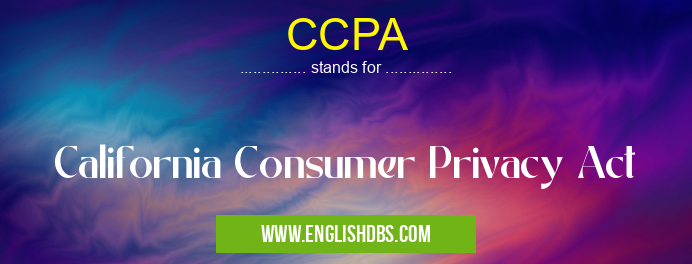What does CCPA mean in LEGISLATION
CCPA stands for the California Consumer Privacy Act, a landmark privacy law that went into effect on January 1, 2020. The CCPA grants California consumers a wide range of rights regarding their personal information and imposes significant obligations on businesses that collect and process such information.

CCPA meaning in Legislation in Governmental
CCPA mostly used in an acronym Legislation in Category Governmental that means California Consumer Privacy Act
Shorthand: CCPA,
Full Form: California Consumer Privacy Act
For more information of "California Consumer Privacy Act", see the section below.
Key Features of the CCPA
- Right to Know: Consumers have the right to request information about the personal data collected about them, including the categories of data, sources of data, and third parties with whom the data has been shared.
- Right to Delete: Consumers have the right to request that businesses delete their personal data, subject to certain exceptions, such as when the data is necessary for a legitimate business purpose.
- Right to Opt-Out: Consumers have the right to opt out of the sale of their personal data to third parties.
- Right to Non-Discrimination: Businesses cannot discriminate against consumers who exercise their privacy rights under the CCPA.
- Enforcement: The CCPA is enforced by the California Attorney General's Office, with penalties of up to $7,500 per violation.
Scope of the CCPA
The CCPA applies to businesses that:
- Have a physical presence in California
- Collect personal information from California residents
- Have an annual gross revenue of $25 million or more
- Buy, receive, sell, or share personal information of 50,000 or more California residents, households, or devices
Meaning of CCPA
In the context of governmental regulations, CCPA signifies the California Consumer Privacy Act. It represents a significant step towards protecting the privacy rights of California consumers and sets a strong precedent for other states and countries to consider similar legislation.
Essential Questions and Answers on California Consumer Privacy Act in "GOVERNMENTAL»LEGISLATION"
What is the California Consumer Privacy Act (CCPA)?
The CCPA is a state law that gives California residents specific rights regarding the collection, use, and sharing of their personal information by businesses.
Who does the CCPA apply to?
The CCPA applies to businesses that meet certain criteria, including having annual gross revenue over $25 million, buying, selling, or sharing the personal information of 50,000 or more California residents, households, or devices, or deriving more than half of their revenue from selling personal information.
What rights does the CCPA give consumers?
The CCPA gives consumers the right to:
- Know what personal information is being collected and how it is being used.
- Request disclosure of the specific pieces of personal information that a business has collected.
- Request that a business delete their personal information.
- Opt-out of the sale of their personal information.
- Not be discriminated against for exercising their CCPA rights.
How do I exercise my CCPA rights?
You can exercise your CCPA rights by contacting the business directly and submitting a request. Businesses must provide a toll-free number or email address for submitting requests.
What are the penalties for violating the CCPA?
Businesses that violate the CCPA may be subject to fines of up to $7,500 per violation.
Final Words: The CCPA is a groundbreaking privacy law that empowers California consumers to take control of their personal information. By granting consumers extensive rights and imposing strict obligations on businesses, the CCPA sets a new standard for data privacy protection and serves as a model for future privacy legislation.
CCPA also stands for: |
|
| All stands for CCPA |
